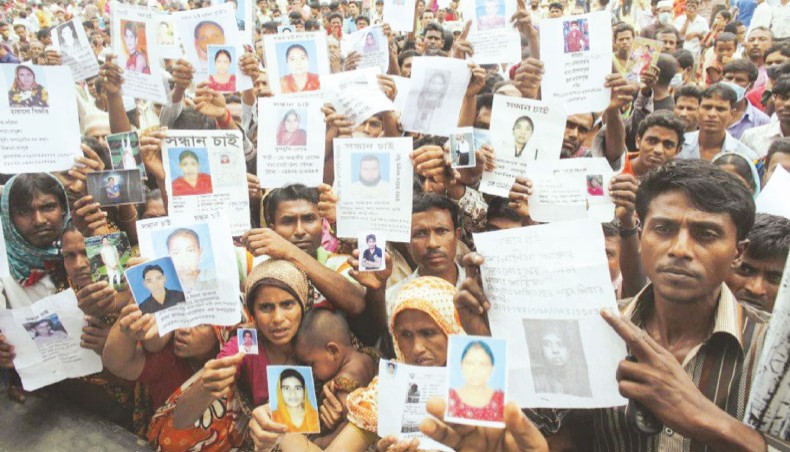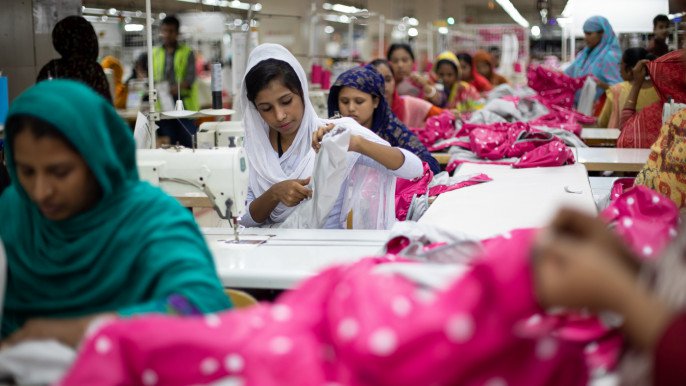Published in New Age on May 26, 2018

Photo: Reuters/ New Age
Instead of fulfilling its pledge to develop a compensation protocol in line with the ILO convention, the government is now working to reform the labour law by setting the maximum compensation at meagre Tk 2 lakh.
Following the tragic fire incident at Tazreen Fashions Ltd on November 24, 2012, which killed at least 114 workers and injured 200, mostly women, the government adopted the National Tripartite Plan of Action on Fire Safety for the Readymade Garment Sector in Bangladesh and promised to develop by December 31, 2013 a tripartite protocol for compensation to the families of workers who die and get injured as a result of occupational accidents and diseases.
Labour leaders and rights activists have strongly opposed the proposed compensation amount and have said that it is very unfortunate that the government have not kept its promise.
More than five years have passed since the government committed to create a binding mechanism to ensure compensation to workers who get injured or die in workplace accidents, yet it has not taken any initiative in this regard, they said.
The government, however, claimed that the compensation amount would be finest considering country’s socio economic condition.
In the NTPA on Fire Safety for the Readymade Garment Sector in Bangladesh, the government had made commitment that the tripartite protocol would include a review of the appropriateness of the level of current legal entitlement to compensation, bearing in mind the concept of loss of earnings and the provisions of International Labour Organisation Convention 121.
The government, employers and labour leaders on March 16, 2013 recognised the tripartite plan of action as their individual and collective responsibility.
After the Rana Plaza building collapse on April 24, 2013, which killed more than 1,100 people and injured hundreds, mostly garment workers, the government included structural integrity in the action plan and once again promised to ensure a legal entitlement to compensation for workers.
The action plan was signed by the then labour secretary Mikail Shipar, Bangladesh Employers Federation president Md Fazlul Hoque, National Coordination Committee for Workers Education chairman Sukkur Mahmud, Bangladesh Garment Manufacturers and Exporters Association vice-president Reaz-Bin-Mahmood, Bangladesh Knitwear Manufacturers and Exporters Association vice-president Mohammad Hatem and IndustriAll Bangladesh Council general secretary Roy Ramesh Chandra.
‘At the moment I cannot remember what was written regarding compensation in the NTPA. I would like to say that as a signatory country, we want to follow all the conventions of ILO but Bangladesh is yet to be ready to develop a protocol for compensation as per the ILO convention,’ state minister for labour Md Mujibul Haque told New Age on Friday.
Wajed-ul Islam Khan, former co-coordinator of Sramik-Karmachari Oikya Parishad, said that it was very much unfortunate for the government not to take any initiative to fulfil its commitment regarding compensation in five years.
He also opposed setting only Tk 2 lakh as maximum compensation for a worker’s death. ‘More than 12 years ago, the government set Tk 1 lakh as compensation for death caused by any workplace accident. If we consider the present socio-economic situation the amount should increase more than five times. Tk 2 lakh is completely unacceptable,’ he said.
Wajed also said that the government was trying to protect the interests of the owners in the amendments to the labour law.
‘We have been demanding for fixing a national minimum amount of compensation but the government has not take any initiative,’ Bangladesh Institute of Labour Studies executive director Sultan Uddin Ahmed said.
‘Even if we agree with the government that Bangladesh is not ready to develop the compensation protocol as per the ILO convention, the amount of Tk 2 lakh is not acceptable,’ he said.
The proposed amount in the draft amendment to the labour act is nothing but an attempt to deprive workers, Sultan said.
 CPD RMG Study Stitching a better future for Bangladesh
CPD RMG Study Stitching a better future for Bangladesh



